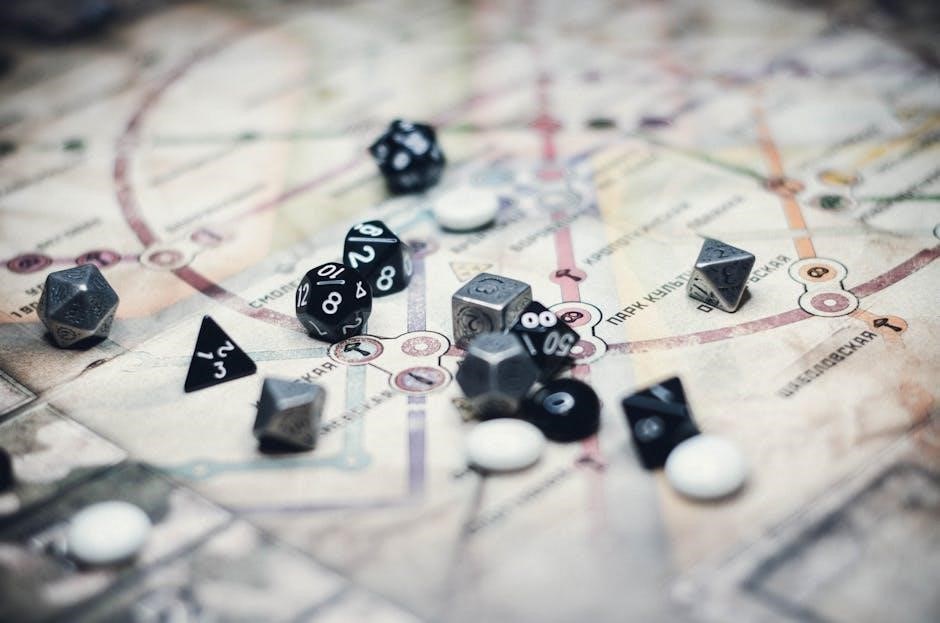The infamous F․A․T․A․L․ RPG is a controversial tabletop game known for its complex mechanics and adult themes, often criticized for its design and content․ Originally a free download, it has garnered notoriety for its detailed character creation and combat systems, though its availability has diminished over time․
Overview of the Game and Its Significance
F․A․T․A․L․ is a tabletop role-playing game notorious for its complex and often criticized design․ It gained attention for its detailed character creation, intricate combat mechanics, and controversial adult themes․ Despite its niche appeal, the game has been widely panned for its perceived flaws, including excessive rules complexity and problematic content․ Its significance lies in its attempt to push boundaries in RPG design, though it has largely become a cautionary example in game development․ While some players appreciate its unique approach, others view it as a poorly executed experiment․ The game’s availability has diminished over time, but its reputation as one of the most infamous RPGs endures, often cited in discussions about game design pitfalls and player preferences․ Its impact, though largely negative, remains a topic of interest in the RPG community․
History and Development of F․A․T․A․L․
F․A․T․A․L․ was created by Byron Hall and first released in the early 2000s as a free PDF․ The game gained notoriety for its highly detailed and often controversial design, which aimed to create a realistic medieval fantasy setting․ Hall’s vision was to craft a game that emphasized complexity and depth, but it ultimately became infamous for its poor execution and offensive content․ The game’s development was marked by a lack of external feedback, leading to a final product that alienated many players․ Despite its flaws, F․A․T․A․L․ remains a significant example of how not to design an RPG, serving as a cautionary tale in the tabletop community․ Its reputation has endured long after its initial release, though it is no longer widely available․

Game Mechanics and Core Features
F․A․T․A․L․ features highly complex rules, emphasizing realism and intricate character creation․ Its combat and skill systems are notoriously detailed, with extensive dice rolls and calculations required․
Character Creation and Attributes
Character creation in F․A․T․A․L․ is notoriously complex, with a focus on detailed customization․ Attributes are rated from 1 to 20, influencing a wide range of skills and interactions․ The system emphasizes realism, requiring players to carefully balance their characters’ abilities․ Skill levels, referred to as “practice,” also range from 1 to 20, adding another layer of depth․ The game’s design allows for extensive tailoring of characters, making each one unique․ However, this complexity can overwhelm new players․ The inclusion of adult-themed mechanics further divides opinions, with some praising its audacity and others criticizing its implementation․ Despite its challenges, the system offers unparalleled depth for those willing to invest time and effort into crafting their characters․ This aspect has become a hallmark of F․A․T․A․L․’s controversial yet intriguing design․
Combat System and Dice Mechanics
F․A․T․A․L․’s combat system is renowned for its complexity and emphasis on realism․ Battles are resolved through multiple dice rolls, with players and the GM engaging in extensive calculations to determine outcomes․ The game’s mechanics prioritize granular detail, making combat both tactical and time-consuming․ Fatal injuries and permanent consequences are central to the system, adding a layer of risk to every encounter․ While this depth appeals to some, it has been criticized for being overly cumbersome and inaccessible to new players․ The reliance on math and dice rolling can slow down gameplay, but it also creates a unique, immersive experience for those who master it․ This system, while divisive, remains a hallmark of F;A․T;A․L․’s identity as a intricately designed RPG․
Skill and Magic Systems
F․A․T․A․L․’s skill and magic systems are highly detailed, with skills rated from 1-20, reflecting a character’s proficiency․ Magic is similarly intricate, with spells requiring precise calculations and resource management․ The game emphasizes realism, with skills and magic governed by strict rules and limitations․ Players must carefully plan and execute actions, as even minor errors can lead to critical failures or unintended consequences․ While this depth offers immersive gameplay, it also creates a steep learning curve․ The system’s complexity has been praised for its depth but criticized for being overly cumbersome․ Despite this, the skill and magic systems remain central to F․A․T․A․L․’s identity, appealing to players who enjoy intricate mechanics and strategic planning․

Setting and World-Building
F․A․T․A․L․ features an expansive universe with rich lore, offering players a deeply immersive experience․ Its intricate world-building includes diverse regions and key locations that enhance gameplay․
The Lore and Universe of F․A․T․A․L․
F․A․T․A․L․ is set in a sprawling, intricate universe with a rich history and lore․ The game’s world-building includes detailed descriptions of various races, cultures, and magical systems, offering players a vast and immersive environment․ The lore is designed to provide depth and context, allowing for complex storytelling and character development․ While the game’s universe is extensive, some critics argue that its sheer complexity can overwhelm players․ Despite this, fans of the game appreciate its unique take on traditional fantasy elements, blending them with darker, more mature themes․ The universe of F․A․T․A․L․ remains a key aspect of its identity, setting it apart from other RPGs․
Key Locations and Regions
F․A․T․A․L․ features a diverse array of key locations and regions, each with unique characteristics and significance․ From sprawling cities to ancient ruins, these areas provide a backdrop for intricate storytelling and immersive gameplay․ Certain regions are renowned for their magical properties, while others are marked by political turmoil or hidden dangers․ The game’s detailed world-building ensures that each location is rich in lore, offering players a wide range of environments to explore․ Whether it’s a mystical forest teeming with life or a desolate wasteland scarred by conflict, the diverse regions of F․A․T․A․L․ contribute to its immersive and complex universe․ These locations are not merely settings but integral parts of the game’s narrative and mechanical design․

Reception and Controversies
F․A․T․A․L․ is often regarded as one of the worst RPGs due to its controversial content, including adult themes, racism, and problematic mechanics, sparking heated debates in the gaming community․
Positive Reviews and Unique Aspects
Despite its notoriety, F․A․T․A․L․ has been praised for its complex character creation and detailed skill systems, offering depth and customization․ Its unique magic system and intricate combat mechanics appeal to players seeking realism․ The game’s ability to simulate realistic scenarios and its departure from traditional RPG structures have drawn niche appreciation․ While controversial, its ambitious design and sheer scope set it apart, making it a fascinating study for RPG enthusiasts and designers alike․
Negative Feedback and Criticisms
F․A․T․A․L․ has faced significant criticism for its explicit adult themes and controversial content, which many find excessive and off-putting․ Critics argue that the game’s handling of sensitive topics, including racism, is problematic and tone-deaf․ The complex and cumbersome mechanics, requiring extensive dice rolling and mental math, have been cited as frustrating and impractical․ Additionally, the game’s availability issues, having once been a free download but now difficult to access, have further alienated potential players․ These factors contribute to its notorious reputation and limited appeal, making it a polarizing figure in the RPG community․
Comparison with Other RPGs
F․A․T․A․L․ stands out starkly against mainstream RPGs like Dungeons & Dragons and World of Darkness due to its explicitly adult content and intricate mechanics․ While other games focus on storytelling or strategic simplicity, F․A․T․A․L․ emphasizes complex calculations and realism, often overwhelming players․ Its reputation contrasts sharply with more accessible systems, leading to a niche audience․ Despite this, some argue its depth rivals games like GURPS, though its controversial themes set it apart․ Overall, F․A․T․A․L․ remains a polarizing example of extreme game design in the RPG genre․

Cultural Impact and Legacy
F․A․T;A․L․ has left a lasting mark as a notoriously controversial RPG, often cited as a cautionary tale in game design․ Its infamous reputation endures in discussions about tabletop gaming․
Influence on the RPG Community
The F․A․T․A․L․ RPG has had a significant, albeit controversial, influence on the tabletop RPG community․ Its notorious reputation as one of the worst-designed RPGs has made it a cautionary tale, often cited in discussions about game design and ethics․ Many designers and players reference F․A․T․A․L․ as an example of how not to create a role-playing game, highlighting its overly complex mechanics, problematic themes, and lack of balance․ Despite its flaws, it has sparked important conversations about inclusivity, consent, and responsible game design․ Some credit it with pushing the boundaries of what RPGs can explore, even if its execution was deeply flawed․ Its legacy serves as a reminder of the importance of community feedback and ethical considerations in game creation․
Memetic Status and Notoriety
F․A․T․A․L․ has become a meme and a symbol of infamy within the RPG community, often cited as one of the worst tabletop games ever created․ Its notoriety stems from its poorly designed mechanics, controversial adult themes, and cringeworthy writing․ Players and critics alike frequently mock its overly complex rules and questionable content, turning it into a cautionary tale․ Despite its lack of official support, F․A․T․A․L․ has gained a cult following, with some embracing it ironically for its sheer audacity․ Its reputation as a “so-bad-it’s-good” experience has cemented its place in internet folklore, making it a recurring topic in discussions about RPG design and humor․ Its infamous status ensures it remains a talking point, even years after its initial release․
F․A․T․A․L․ remains a polarizing and infamous RPG, criticized for its flaws but embraced for its notoriety․ Its legacy endures as a cautionary tale and meme within the RPG community․
Final Thoughts on F․A․T․A․L․ RPG PDF
F․A․T․A․L․ is a game that sparks strong opinions, blending intricate mechanics with controversial content․ While its design flaws and mature themes have led to widespread criticism, it remains a notable example of how RPGs can push boundaries․ Its complex character creation and combat systems, though oftenوزه, offer depth for those willing to invest time․ However, its notoriety often overshadows its potential, making it a polarizing entry in the RPG world․ Despite its flaws, F․A․T․A․L․ serves as a reminder of the diversity and experimentation within tabletop gaming․
